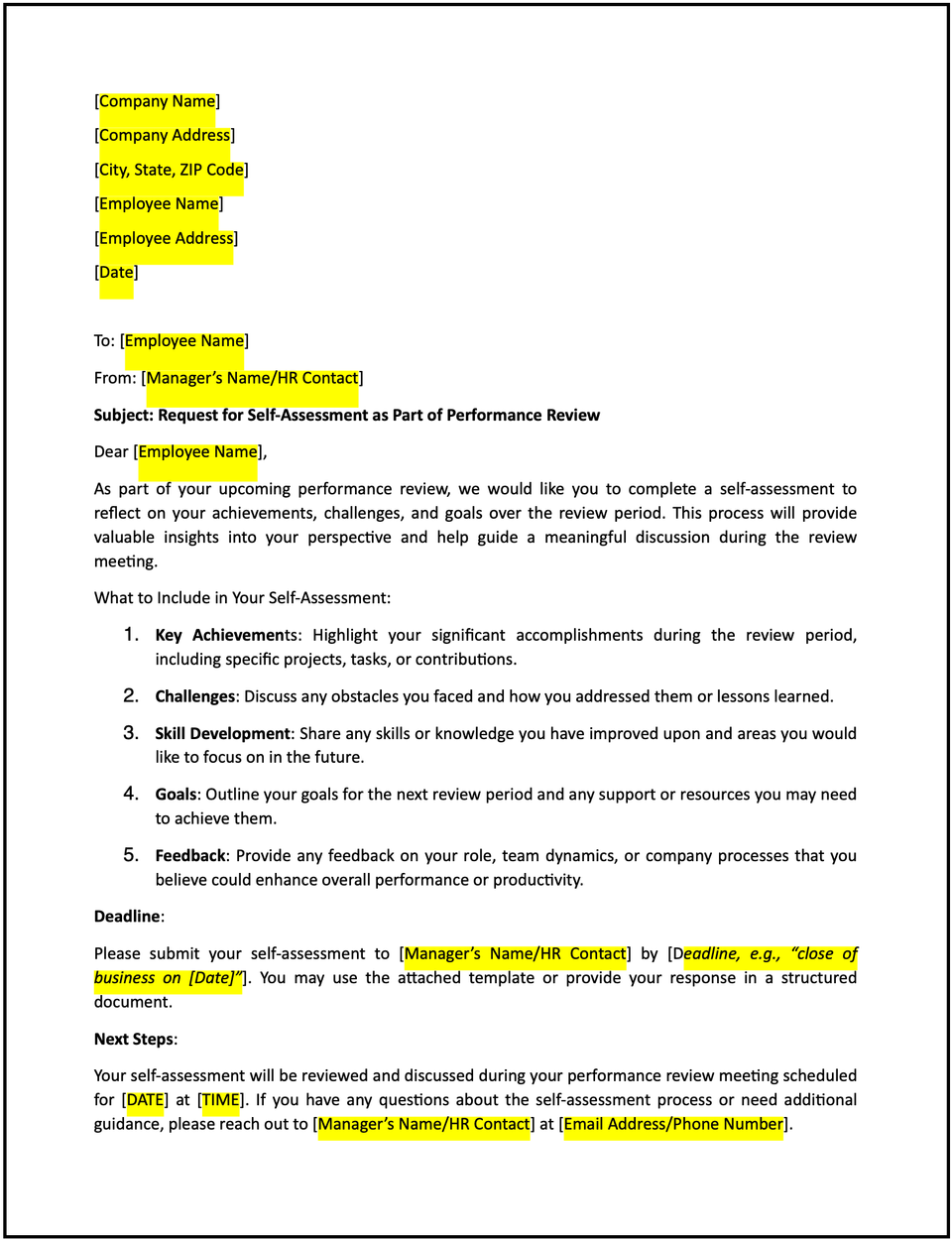Letter of request for self-assessment as part of performance review: Free template

Letter of request for self-assessment as part of performance review
A letter of request for self-assessment as part of a performance review invites an employee to reflect on their achievements, challenges, and contributions to the organization. This letter encourages active participation in the review process, fostering transparency, engagement, and growth.
How to use this letter of request for self-assessment as part of performance review
- Open with context: Begin by referencing the upcoming performance review and its purpose.
- State the purpose: Clearly explain that the self-assessment is an integral part of the review process to gather the employee’s perspective.
- Provide guidance: Outline the key areas for reflection, such as accomplishments, areas for improvement, and future goals.
- Include submission details: Specify the format (e.g., written report, template, or online form), deadline, and where to submit the self-assessment.
- Highlight the importance: Emphasize how the self-assessment will contribute to a more meaningful and comprehensive review.
- Offer support: Provide resources or contacts to assist the employee in preparing their self-assessment.
- Maintain a professional and encouraging tone: Ensure the letter is supportive and focused on collaboration.
- Provide contact information: Include details for questions or further discussion.
Benefits of using a letter of request for self-assessment as part of performance review
This letter template ensures a structured and professional way to engage employees in the review process, fostering accountability and growth. Here’s how it helps:
- Encourages reflection: Asking employees to assess their own performance promotes self-awareness and accountability.
- Promotes collaboration: Involving employees in the review process fosters a sense of partnership and transparency.
- Reflects professionalism: A well-crafted letter demonstrates the organization’s commitment to constructive and fair evaluations.
- Supports growth: Providing a platform for employees to articulate goals and challenges fosters development.
- Provides documentation: A formal request creates a record for HR and performance management purposes.
Tips for writing an effective letter of request for self-assessment as part of performance review
- Be specific: Clearly outline the areas to be addressed in the self-assessment, such as achievements, challenges, and goals.
- Use professional language: Maintain a respectful and encouraging tone to promote participation.
- Highlight the purpose: Emphasize the value of self-assessment in creating a comprehensive performance review.
- Include next steps: Provide clear instructions on submission format, deadlines, and follow-up processes.
- Keep it concise: Focus on the key points while ensuring the tone is positive and professional.
Frequently asked questions (FAQs)
Q: What details should I include in this letter?
A: Include the purpose of the self-assessment, key areas for reflection, submission format, deadline, and support resources.
Q: Should I personalize the letter?
A: Yes, addressing the employee directly ensures clarity and demonstrates attentiveness.
Q: Who typically sends this letter?
A: The employee’s manager, supervisor, or an HR representative usually sends this letter.
Q: How formal should this letter be?
A: The tone should be professional yet collaborative, focusing on engagement and growth.
Q: When should this letter be sent?
A: Send the letter at least one to two weeks before the performance review to allow sufficient preparation time.
Q: Can this letter include a template for the self-assessment?
A: Yes, providing a structured template or guide can help employees complete the self-assessment effectively.
Q: Is acknowledgment from the recipient required?
A: While not mandatory, requesting acknowledgment ensures employees are aware of and prepared for the self-assessment.
This article contains general legal information and does not contain legal advice. Cobrief is not a law firm or a substitute for an attorney or law firm. The law is complex and changes often. For legal advice, please ask a lawyer.


